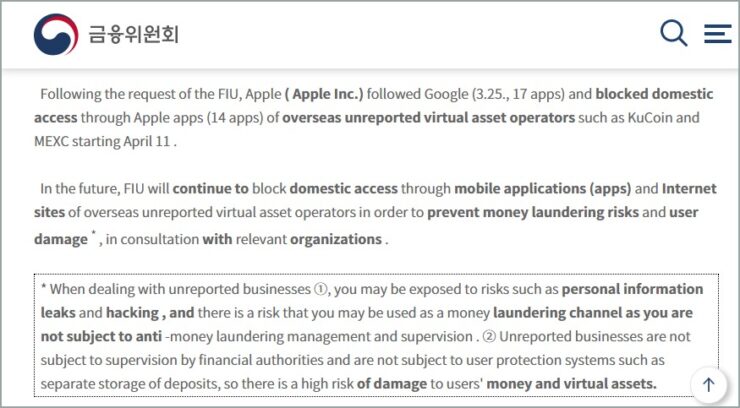South Korea has stepped up its crackdown on unregistered cryptocurrency platforms, ordering the removal of 14 exchange applications from Apple’s App Store and 17 others from Google Play, including prominent global exchanges such as KuCoin and MEXC.
The latest enforcement action, confirmed by the Financial Services Commission (FSC) on Monday, is part of the country’s intensifying effort to regulate the digital asset space and limit access to unauthorized platforms operating without formal registration.
The FSC said the Google Play ban took effect on March 25, with Apple implementing the removal by April 11. The move comes in response to growing concerns raised by the Financial Intelligence Unit (FIU), which has been investigating Virtual Asset Service Providers (VASPs) offering crypto services to South Korean users without appropriate authorization.

Under South Korea’s Act on Reporting and Use of Specific Financial Transaction Information, foreign exchanges are required to register with the FIU before engaging Korean users. Violators face up to five years in prison or fines of up to 50 million won (~$35,200) for non-compliance.
This is the latest chapter in a multi-year enforcement campaign. The FSC reported that 16 exchanges were blocked in 2022 and six more in 2023, with authorities continuing to restrict both app-based and web-based access to offshore operators.
Poloniex, BitMart Among Those Targeted as FSC Tightens Enforcement
The enforcement action sheds light on a widening rift between regulated entities and the shadow crypto market. Among the 14 apps removed, two had no publicly identifiable owners, according to a review of the FSC’s records. Poloniex and BitMart—two established platforms with large user bases—were also flagged, though neither has responded publicly to the enforcement.
The latest actions coincide with South Korea’s broader plan to formalize its crypto oversight framework. In January, regulators proposed converting the temporary digital asset task force, established in July 2023, into a permanent investigative agency with expanded jurisdiction over crypto-linked financial crimes.
The crackdown also follows a wave of crypto-related scandals that have tested public trust and heightened political urgency. In one recent case, a government employee was found to have embezzled over 500 million won (~$342,000)—including disaster relief funds—to fund crypto trades. In another, a former lawmaker narrowly escaped conviction over undisclosed crypto holdings. Meanwhile, a mining operation in Gwangju was unmasked as a front for an illegal gambling ring that laundered over 140 million won (~$95,000).
With only 28 licensed crypto firms officially approved to operate in South Korea, regulators are increasingly warning the public about the dangers of using unauthorized platforms. The FSC reiterated its commitment to protecting users from fraud, scams, and financial instability linked to unregulated exchanges.
Quick Facts
- South Korea ordered the removal of 14 unregistered crypto exchange apps from Apple’s App Store and 17 from Google Play, including KuCoin and MEXC.
- The enforcement is based on the Act on Reporting and Use of Specific Financial Transaction Information, which requires foreign exchanges to register with the FIU.
- Non-compliant platforms face up to five years in prison or fines of 50 million won (~$35,200).
- Only 28 crypto businesses are currently registered to legally operate in South Korea.





